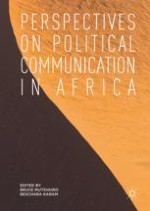
2018 | OriginalPaper | Buchkapitel
1. Key Developments in Political Communication in Africa
verfasst von : Bruce Mutsvairo, Beschara Karam
Erschienen in: Perspectives on Political Communication in Africa
Aktivieren Sie unsere intelligente Suche, um passende Fachinhalte oder Patente zu finden.
Wählen Sie Textabschnitte aus um mit Künstlicher Intelligenz passenden Patente zu finden. powered by
Markieren Sie Textabschnitte, um KI-gestützt weitere passende Inhalte zu finden. powered by